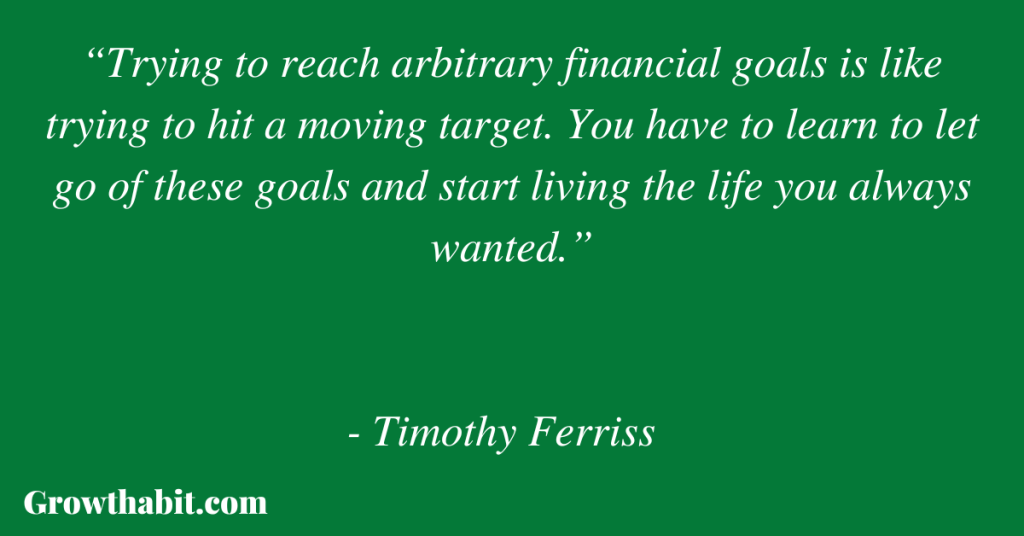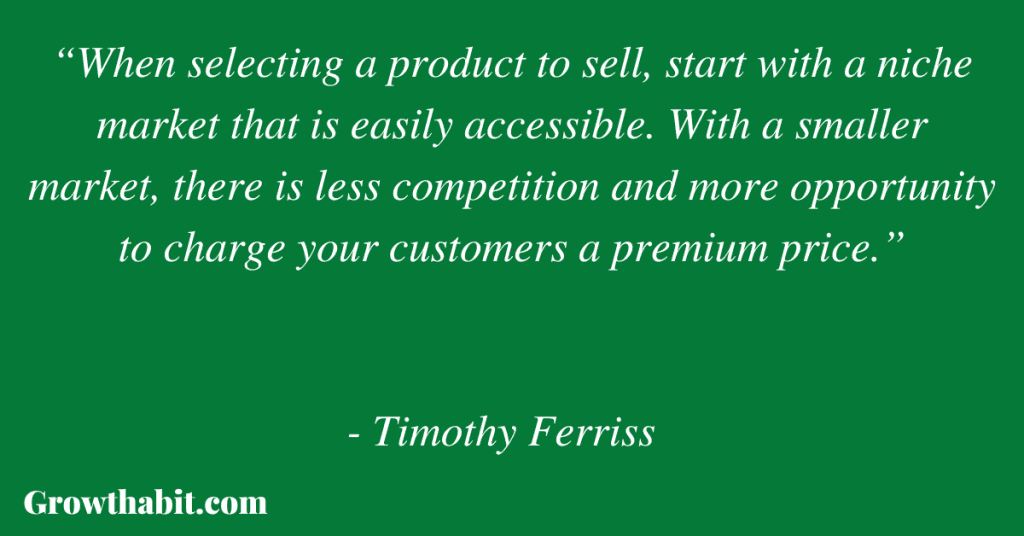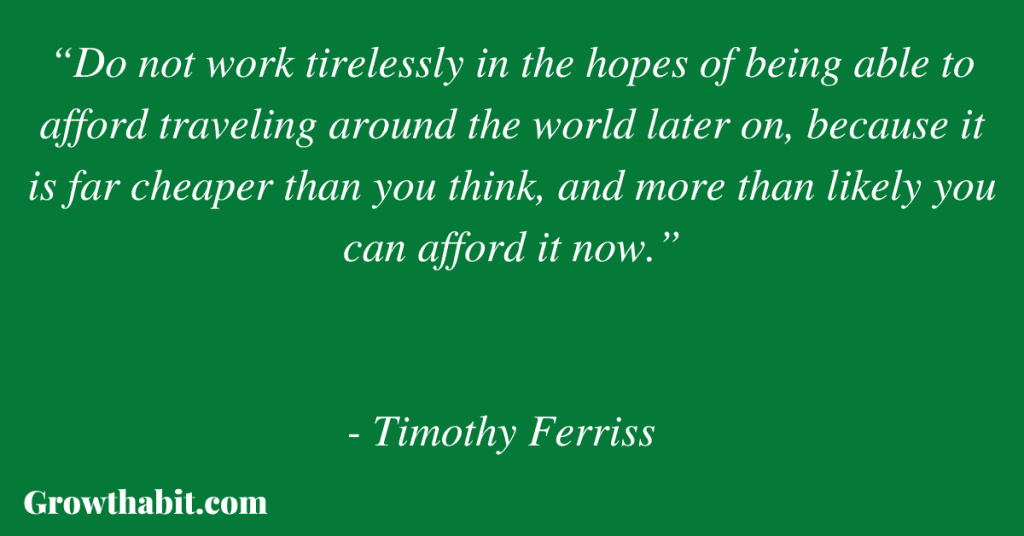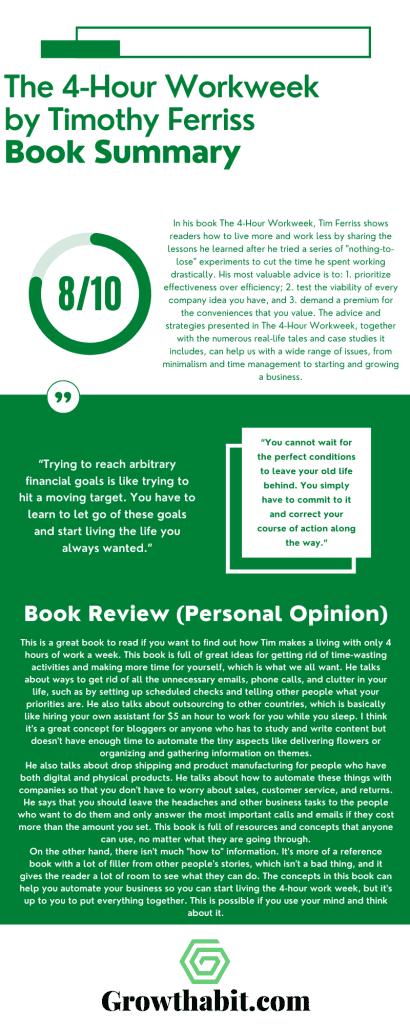In his book The 4-Hour Workweek, Tim Ferriss shows readers how to live more and work less by sharing the lessons he learned after he tried a series of “nothing-to-lose” experiments to cut the time he spent working drastically. His most valuable advice is to: 1. prioritize effectiveness over efficiency; 2. test the viability of every company idea you have, and 3. demand a premium for the conveniences that you value. The advice and strategies presented in The 4-Hour Workweek, together with the numerous real-life tales and case studies it includes, can help us with a wide range of issues, from minimalism and time management to starting and growing a business.
Book Title— The 4-Hour Workweek
Author— Timothy Ferriss
Date of Reading— December 2022
Rating— 8/10
What Is Being Said In Detail
Timothy Ferriss talks about how he went from being a busy, underpaid office worker to a world traveler who uses technology to cover for him. He was able to make this change because of a concept called “Lifestyle Design (LD),” which is a mix of art and science. He shares his recipe so that others can learn from it. He was the kind of person who believed in working like a mule from 9 to 5, and he loved getting a weekend or two to have fun and unwind. Things have changed since then, though. He thinks that life doesn’t have to be that hard and that you don’t have to wait until retirement to enjoy the benefits of hard work.
To join the New Rich, Ferriss suggests a set of steps to take that spell out the letters DEAL. Each of the following is looked at in turn in the book by chapters.
Step I: D is for Definition
D for Definition flips our misguided common sense and teaches us the rules and basics of the new game by building a foundation for the design of our lifestyles.
Having a lot of money and being able to live like a millionaire are two very different things. In the same way, the difference between “deferrers” (D) and “newly rich” (NR) is that “deferrers” save everything good and worthwhile for the end and are surprised by how soon it comes, while “newly rich” give up this “deferred-life plan” and use time and mobility to create a luxury lifestyle in the present. The NRs stand out from the rest of the crowd because their goals show that they have very different priorities and ways of looking at life.
In real life, money can grow based on how many “W’s” you can control: what, when, where, and with whom. This is called the ‘freedom multiplier’. An NR will work for a quarter of the time that the average person does. They may make less money, but when we look at what they can do with the money they make, it will be worth more.
The “ability to choose” is what gives us real power, not the money we make. That’s why this book is all about seeing and making the choices that give us the power to choose with the least amount of work and money.
Ferriss gives some helpful rules about this:
- You shouldn’t think of retirement as the end goal of all your hard work. Instead, you should think of it as a life insurance policy that will help you if you get sick or hurt.
- NRs try to have mini-retirements throughout their lives. This lets them work when they are most productive and relax when they are not.
- Working less doesn’t mean you’re lazy unless you’re not getting much done.
- Your biggest plans will never be perfect, so you should just go for it.
- It’s better to focus on your strengths than to always try to fix your weaknesses.
- Too much, too many, or too often of something you want turns it into something you don’t want. This is true for both things and time.
- We think that money will solve all our problems, so we give up having fun in order to get it.
- The NRs don’t try to get rid of all stress because some stress is good.
Step II: E is for Elimination
E for Elimination gets rid of the old way we all think about managing time. This section shows readers how to use counterintuitive NR techniques to get better results per hour. It also focuses on “Time,” the first of the three elements of a luxury lifestyle design.
You shouldn’t try to keep yourself busy every second of the day. Instead, you should choose a different path, one that not only gives you more results but also makes them multiply. People often say they are busy to avoid doing a few important but uncomfortable things.
Effectiveness is doing things that move you closer to your goal, while efficiency is doing a task with as few resources as possible. You must remember that:
- Doing something unimportant well doesn’t make it important.
- A task is not important just because it takes a lot of time.
- How you do something is not nearly as important as what you do.
Even though ignorance may be bliss, it is also useful. Selective ignorance is when you don’t pay attention to or get rid of information or interruptions that don’t matter, aren’t important, or can’t be done anything with. The first thing you should do is limit the amount of information you take in. This is because most information is useless, takes too much time, is bad, or is out of your control.
An interruption can be a waste of time, a waste of time, or a failure to give power. Time wasters are things that can be ignored with little or no effect, while time consumers are things that need to be done but often get in the way of more important work. Empowerment failures are when someone needs permission to do something small.

The easiest way to get rid of time wasters is to limit their access and direct communication toward action.
Step III: A is for Automation
A for Automation uses outsourcing to take care of cash flow on autopilot. This section talks about income, the second part of a luxury lifestyle design.
It’s important to know that even if you can do something yourself for less money or better than most people, you don’t have to spend your time doing it. Even if the price is sometimes more per hour than what you make now, the trade is usually worth it.
Assignments that don’t make sense, aren’t important, or aren’t done in the best way are neither fun nor helpful. Delegation should be used to cut down on work, not as an excuse to do important things. No one should do something unless it is clear and important. If you don’t want to waste your time and money, you should never automate something that can be done by hand, and you shouldn’t delegate something that can be done by hand. The solution is to get rid of things before you give tasks to other people.
To join the New Rich and only work 4 hours a week, the key isn’t to run a business. It’s a way to own a business without having to work on it. Ferriss says that for your business to get going, you should do the following:
- It can’t cost more than $500 to test the product in question.
- Within four weeks, it must be possible to automate it.
- When it’s set up, it can’t need more than one day of management per week.
Step IV: L is for Liberation
To get people to work from home instead of in the office, we will do two important things: show how working from home is good for business and make it hard or expensive to say no to a request to work from home.
The author describes a simple five-step plan for increasing the power of leveraging for remote work:
- Get your employer to put more money into you. This could mean asking the company to pay for you to take a course to improve your skills. The idea behind this is that the more a company puts into you, the more they stand to lose if you leave.
- Show that you got more done when you weren’t in office. You could call in sick for two days and then work from home. This would let you do twice as much work and give your bosses proof of how hard you work when you’re not there.
- Prepare the business benefit that can be measured. This means making a list of bullet points that show how much more you get done when you’re not at work.
- Offer a trial period of working from home. This could begin with just one day a week.
- From here, you can slowly increase the amount of time you work from home. Make sure your days when you work from home are your most productive, and then set up a meeting with your boss to talk about the results.
Most Important Keywords, Sentences, Quotes
Chapter I
“Trying to reach arbitrary financial goals is like trying to hit a moving target. You have to learn to let go of these goals and start living the life you always wanted.”
“You cannot wait for the perfect conditions to leave your old life behind. You simply have to commit to it and correct your course of action along the way.”

“Stop using money as an excuse for why you aren’t living the life you want to live. It is not the answer, but the barrier in your mind that stops you from evaluating yourself truthfully and correcting your life.”
“Do not avoid all criticism, just the destructive kind, such as abusive relationships and bosses. Positive criticism, such as role models and trainers that push us to exceed our limits, is how we learn and grow.”
“The opposite of happiness is not sadness, but boredom. Excitement is the most practical way to achieve happiness. So do not search for what will make you happy, but for what excites you.”
Chapter II
“You have to change your mindset from believing that efficiency is as important as effectiveness, because what you do is more important than how you do it. Being efficient does not bring you any closer to accomplishing your goals.”
“To be effective, you will have to take a hard look at your life and work and see what things are worth your time and energy. If you play to your strengths and ignore things that make you frustrated, you end up being happier while also working less.”
“As an employee, you must focus on the most important tasks and set very short deadlines for yourself. By doing so, you’ll eliminate empty work time and force yourself to focus on those tasks in order to accomplish them in time.”
“The information you pay attention to needs to be important, otherwise it will consume your time and energy. You need to be selectively ignorant, and redirect your attention to things that matter directly to you. You can start by simply consuming less information.”
“If it’s difficult to stop consuming certain types of media or information, take a one-week information fast. Cut yourself off completely, and use that time for family or exercise. Soon you’ll figure out which information is vital to you and learn to cut out the rest.”
“Three main interruptions stop us from completing important tasks, and they are: 1) time wasters – things that can be ignored without any consequences, 2) time consumers – repetitive tasks such as emails, and 3) empowerment failures – when others need your approval to get small things done.”
Chapter III
“Get yourself an assistant. Whether you own a business or not, paying someone to do your non-vital tasks frees up your time, and allows you to focus on more important tasks. If the extra help lets you work less, it is worth it.”
“Every task you delegate should free up your time and be well-defined. Be sure to speak or write clearly on what the task is and what you expect the result to look like. Set short deadlines to ensure little time is wasted and check in periodically for updates and questions.”
“To truly live the 4-hour workweek, you need to create a business or sell a product that generates cash flow and doesn’t consume much of your time.”
“When selecting a product to sell, start with a niche market that is easily accessible. With a smaller market, there is less competition and more opportunity to charge your customers a premium price.”
“For each of your potential products, use the “best, test, and invest” method. This involves researching competition for your product and “besting” them with more compelling advertising, “testing” the product with cheap ads, and “investing” in the products that do well.”
Chapter IV
“To escape the 9-5 in-office workweek and begin the 4-hour workweek lifestyle, you’ll need to show the benefits of working remotely, and make it extremely difficult for your boss to keep you in the office.”
“Several fears keep people from leaving their full-time jobs. They are afraid that quitting is permanent, they won’t be able to make their payments, they’ll lose their insurance and retirement accounts, and their résumé will be ruined.”

“Do not work tirelessly in the hopes of being able to afford traveling around the world later on, because it is far cheaper than you think, and more than likely you can afford it now.”
“Don’t forget to keep following and rethinking your “dreamlines.” Anything that excites you and brings you happiness is worth doing. Try to avoid comparing yourself with others that work traditional 9-5 jobs and remind yourself you were unhappy when you worked like them.”
Book Review (Personal Opinion):
This is a great book to read if you want to find out how Tim makes a living with only 4 hours of work a week. This book is full of great ideas for getting rid of time-wasting activities and making more time for yourself, which is what we all want. He talks about ways to get rid of all the unnecessary emails, phone calls, and clutter in your life, such as by setting up scheduled checks and telling other people what your priorities are. He also talks about outsourcing to other countries, which is basically like hiring your own assistant for $5 an hour to work for you while you sleep. I think it’s a great concept for bloggers or anyone who has to study and write content but doesn’t have enough time to automate the tiny aspects like delivering flowers or organizing and gathering information on themes.
He also talks about drop shipping and product manufacturing for people who have both digital and physical products. He talks about how to automate these things with companies so that you don’t have to worry about sales, customer service, and returns.
He says that you should leave the headaches and other business tasks to the people who want to do them and only answer the most important calls and emails if they cost more than the amount you set. This book is full of resources and concepts that anyone can use, no matter what they are going through.
On the other hand, there isn’t much “how to” information. It’s more of a reference book with a lot of filler from other people’s stories, which isn’t a bad thing, and it gives the reader a lot of room to see what they can do. The concepts in this book can help you automate your business so you can start living the 4-hour work week, but it’s up to you to put everything together. This is possible if you use your mind and think about it.
Rating: 8/10
This Book Is For:
- People who want to spend their time wisely and to get the most it.
- Your professionals who want to become more productive with the resources they have.
- Millennials who want to learn how the business world functions
If You Want To Learn More
Here is an interview with Timothy Ferris in which he generally presents The 4-Hour Workweek and his main inspirations for writing the book. Interview | The 4-Hour Workweek | Tim Ferriss
How I’ve Implemented The Ideas From The Book
Tim Ferris teaches the readers about the significance of organization, the Pareto principle of prioritization, engaging in work that one is passionate about, and knowing how to use our time wisely. All of these are aspects of my life that I have been focusing my attention on improving for a considerable amount of time. Yesterday, I chose to have a quick phone call instead of a longer meeting in person. For example, the meeting in person would have taken a lot more time. He made me aware that I need to protect the time I spend. The book isn’t about working 4 hours a week. Instead, it’s about doing what we love in a more efficient and effective way. Most people hate their jobs, so this book will show them how to make money on their own, so they don’t have to depend on their day job.
One Small Actionable Step You Can Do
This book will show you how to base your projects (or ideas of things you would like to achieve), beginning with the first concept and progressing all the way to having extremely defined daily chores. Starting with the 80/20 rule and putting your whole attention on the one factor that will have the most impact on your success is, in my opinion, the single most essential thing you can do. By proceeding in this manner, you are advancing toward the accomplishment of that significant objective that you have set for yourself. And naturally, in addition to adopting these measures, you are also working in a more intelligent manner.

